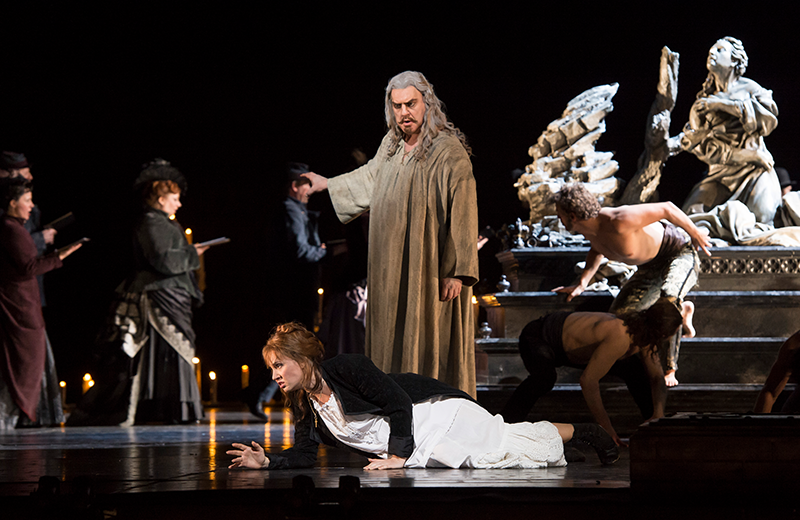2019年2月アーカイブ
2019年2月28日
Faust
Faust
Opera in five acts
| Music Charles-François Gounod |
| Libretto Jules Barbier and Michel Carré after Carré's Faust et Margurite and Johann Wolfgang von Goethe's Faust Part I |
| Conductor Antonio Pappano |
| Director David McVicar |
| Set designer Charles Edwards |
| Costume designer Brigitte Reiffenstuel |
| Lighting designer Paule Constable |
| Revival Choreographer Emmanuel Obeya |
Running Time About 3 hrs 40 mins including an intermission.

The Story
Disillusioned with life, the aged philosopher Faust calls upon Satan to help him. The devil Méphistophélès appears and strikes a bargain with the philosopher: he will give him youth and the love of the beautiful Marguerite, if Faust will hand over his soul. Faust agrees, and Méphistophélès arranges matters so that Marguerite loses interest in her suitor Siébel and becomes infatuated with Faust.
Faust initially seems to love Marguerite in return, but soon abandons her. Her brother Valentin returns from the war and is furious to find his sister pregnant. Will Faust repent his destructive actions, and can his soul, and Marguerite's, be saved?
Background
Gounod's Faust (1859) was one of the world's most popular operas from the 1860s to World War II, and remains a core repertory work. The story, adapted by Gounod's librettists Jules Barbier and Michel Carré from Carré's play Faust et Marguerite, is based on Part I of Goethe's epic poem Faust, which was a major inspiration for many composers during the 19th century and beyond. Gounod added a ballet to Act V when Faust received its first Paris Opéra staging in 1869.
David McVicar's wonderfully theatrical production draws insightful parallels between Faust and Gounod, a composer torn between piety and worldly and romantic success. Sets and costumes by Charles Edwards and Brigitte Reiffenstuel pay tribute to the art and architecture of 1870s Paris, and include a colourful Cabaret d'Enfer, a run-down tenement block and re-creations of a box from the Paris Opéra and the organ loft of Notre-Dame. The variety of settings mirrors the variety in Gounod's score, highlights of which include Méphistophélès's demonic aria 'Le veau d'or', Marguerite's dazzling coloratura Jewel Song, the Act IV Soldiers' Chorus and Act V's impassioned trio as Marguerite struggles to achieve salvation.
https://www.roh.org.uk/productions/faust-by-david-mcvicar




2019年2月27日
Otello
Otello
Dramma lirico in four acts
| Music Giuseppe Verdi |
| Libretto Arrigo Boito after the play by William Shakespeare |
| Conductor Antonio Pappano |
| Director Keith Warner |
| Set designer Boris Kudlička |
| Costume designer Kaspar Glarner |
| Lighting designer Bruno Poet |
| Movement Director Michael Barry |
| Fight Director Ran Arthur Braun |
Running Time About 3 hrs 15 mins including an intermission.

The Story
Iago sows the seeds of jealousy in Otello's mind, fabricating a story of an affair between Iago's rival Cassio and Otello's young wife Desdemona. Iago's trickery cements Otello's suspicion into mistaken certainty.
Otello murders the innocent Desdemona. Confessions by Iago's accomplices - including his unknowing wife Emilia - lead to the revelation of Iago's plot. Appalled by the wrong he has committed, Otello kills himself.
Background
Otello is Verdi's final tragedy. After astonishing productivity in his early career, the composer slowed in later life; more than fifteen years separate Otello and its predecessor, Aida, although Verdi revised his earlier works Simon Boccanegra and Don Carlo in the interim. He was lured out of retirement by the composer and librettist Arrigo Boito, who tempted him with a proposal that was very close to Verdi's heart: Shakespeare's Othello. Boito adapted the libretto from Shakespeare's play, with much intervention from Verdi. As the latest utterance from the master of Italian opera, the 1887 premiere was an instant success - but, more than that, Otello has been an important part of the international opera repertory ever since.
The Italian musical landscape had changed during Verdi's period of isolation, with many of his compatriots finding inspiration in foreign operatic innovations. Verdi responds in Otello with music that looks back to the traditional forms and structures of Italian opera, but which carries an unmistakably different dramatic thrust and fluidity, in response to Shakespeare's text. The results are thrilling: from the violent storm that opens the opera through to Iago's blood-chilling Credo and Otello's increasingly desperate duets with Desdemona. Keith Warner (Wozzeck, Der Ring des Nibelungen) directs a new production of this masterpiece, The Royal Opera's first in 30 years.
https://www.roh.org.uk/productions/otello-by-keith-warner


